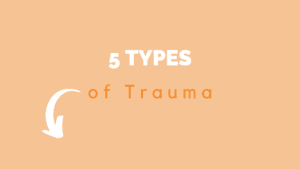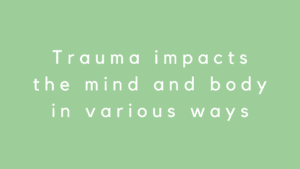What is Trauma?
Trauma is defined as “an emotional response to a terrible event like an accident, rape or natural disaster.”1. Trauma can be a multitude of things and can differ from one person to the next. What is traumatic to one person may not be to someone else, even if they experienced the same event.

Type One Trauma
Type one trauma involves single-incident trauma, which is an event that occurs out of the blue. This is often referred to as Big T Trauma. A diagnosis related to these types of trauma is Post-Traumatic Stress Disorder. Examples include:
- Sexual or Violent Assault
- Severe Illness/Injury
- Traumatic Loss
- Robbery
- Victim to or Witness of Violence, Terrorist Attack, or Natural Disaster
- Car Accident
- Military Combat Incident
- Medical or Psychiatric Hospitalization
- Childbirth
- Medical Trauma
- Suicide Attempt
- Life-Threatening Illness/Diagnosis2.
Type Two Trauma
Another type of trauma is called Type Two Trauma. This type of trauma involves trauma experienced during childhood or early developmental stages. This involves repetitive trauma, which has been repeated over a period of time. This can involve the victim feeling coerced or powerless with preparing for trauma. A diagnosis related to these types of trauma is Complex Post-Traumatic Stress Disorder. Examples include:
- Sibling Abuse
- Sexual, Emotional, Verbal, or Physical Abuse
- Coercion
- Abandonment
- Childhood Emotional Abuse
- Domestic Violence
- Emotional Neglect/Attachment Trauma
- Domestic Physical Abuse
- Long-Term Misdiagnosis of health problem
- Bullying at Home, at School, or in a Work Setting
- Overly Strict Upbringing, sometimes Religious3.
Historical, Collective, Intergenerational Trauma
Characterized by Psychological/Emotional difficulties affecting different communities, cultural groups, and generations. Adaptive coping patterns can be found to pass from one generation to the next. Examples include:
- Racism
- Slavery
- Forcible Removal from Family/Community
- Genocide
- War
Secondary Trauma
Secondary trauma is experienced when an individual speaks to a victim of first-hand trauma. Through hearing about the trauma, the individual experiences symptoms expressed by the victim.
Little T Trauma
Little T Traumas are part of day-to-day life and are expected as a part of life. These incidents may be extremely traumatic, yet not given the same consideration as big T trauma. These are less-talked about than other types of trauma. Examples include:
- Loss of a loved one
- Moving to a New Home
- Losing a Job4.

Symptoms of Trauma
- Shock
- Denial
- Flashbacks
- Unpredictable Emotions
- Strained Relationships
- Physical Symptoms: Nausea, Headaches [efn_Written by The Trauma Practice[/efn_note].
Trauma’s Impact on the Brain
When we go through trauma, our brain and body reacts to this with a stress response. Our brains remember sensory details of the event, such as smells, tastes, sounds, etc. Since we have these details pop up, we may repeatedly experience flashbacks to the event. For some in this situation, it may lead to mood swings and nightmares related to the event. Most people find these symptoms simmer over time and they are ready to return to a normal routine, while others find these symptoms are only worsening over time. For the latter group, these individuals are likely experience Post-Traumatic Stress Disorder (PTSD)[efn_Written by The Dawn[/efn_note].
What is PTSD?
In a typical situation, once the threat is gone, the nervous system is able to go back to normal status. This return to a normal state is achieved through allowing the brain to function as normal and to lessen the stress hormones. However, for someone dealing with PTSD, their brain does not allow the traumatic event to be accessed in the neomammalian section.
The neomammalian section of the brain is the area that allows us to process trauma and therefore allows us to heal. Since these individuals do not have access to allow this trauma to enter this part of the brain, the trauma stays in the limbic brain, which causes the amygdala to remain in an overly stimulated state. This causes the individual to consistently be in an endless state of arousal, constantly seeking out threats in all situations[efn_Written by The Dawn[/efn_note].
This is why someone who is dealing with PTSD may feel flashbacks even months or years after the event occurred. In a situation like this, the individual often finds their mind to consistently be in an overly stimulated state.
How CBT can Help
Emotional Processing Theory
Emotional Processing Theory infers that individuals who experience trauma may associate their traumatic event with safe reminders of the event. This could include people who the individual may associate with the event, news coverage, etc. The core goal of emotional processing is to change these associations in order to process the event in a healthy, productive way[efn_Written by American Psychological Association[/efn_note].
Social Cognitive Theory
Social Cognitive Theory suggests that some individuals try to incorporate the trauma they experienced into their own ideas about themselves and the world around them. These individuals often end up with unproductive thoughts about their ideas regarding these experiences and self-control, which can lead to developing unhealthy coping skills. With this education and understanding of this theory, the therapist is able to implement CBT strategies with the person in therapy.
Trauma-Focused Cognitive Behavioral Therapy (TF-CBT)
TF-CBT is a type of CBT that has an emphasis on trauma. This practice focuses on the way the brain functions differently in the time following a traumatic event. This theory is based in the concept that our feelings and actions are a direct response to our thoughts, rather than external factors.
Benefits of TF-CBT include:
- Assisting in identifying negative thoughts and emotions
- Learning to cope with loss/grief
- Managing anger
- Managing chronic pain
- Overcoming trauma/dealing with PTSD symptoms
- Preventing relapsed in those with addictions
- Overcoming sleep disorders
- Resolving interpersonal relationship concerns[efn_Written by The Dawn[/efn_note].
Getting Help
If you have experienced trauma that you are having difficulty getting past, our therapists through Online-Therapy.com provide Cognitive Behavioral Therapy (CBT) and can assist in processing the events and emotions.
Our platform offers a complete online therapy toolbox which includes time with a personal therapist who can support you throughout your journey. If this is something you have interest in, we would love to hear from you.
References
American Psychological Association. Trauma. (https://www.apa.org/topics/trauma#:~:text=Trauma%20is%20an%20emotional%20response,symptoms%20like%20headaches%20or%20nausea.). Accessed on 04/04/22.
Posttraumatic Stress Disorder. Cognitive Behavioral Therapy (CBT). (https://www.apa.org/ptsd-guideline/treatments/cognitive-behavioral-therapy). Accessed on 04/04/22.
The Dawn. Trauma-Focused Cognitive Behavioural Therapy-An Effective Method of Overcoming Trauma. (https://thedawnrehab.com/blog/trauma-focused-cognitive-behavioural-therapy/). Accessed on 04/04/22.
The Trauma Practice. Types of Trauma. (https://traumapractice.co.uk/types-of-trauma/). Accessed on 04/04/22.




Leave A Comment